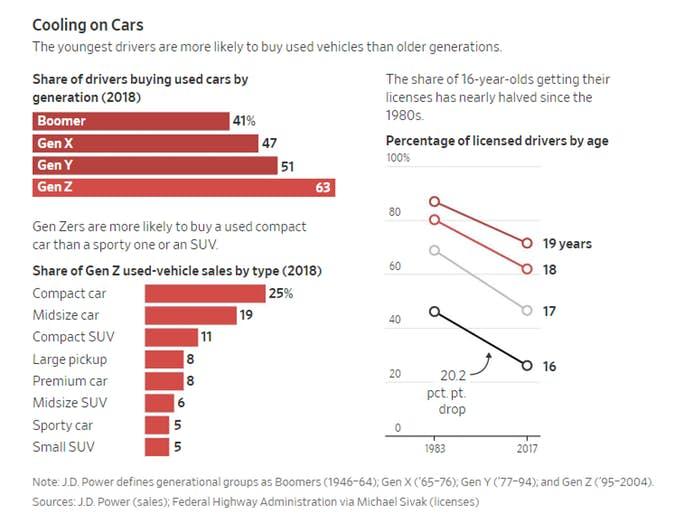At increasing rates, millennials and generation Z see no need to get a drivers license.
The Wall Street Journal has an interesting article that strikes right at the heart of the auto industry: Driving? The Kids Are So Over It.
"About a quarter of 16-year-olds had a driver’s license in 2017, a sharp decline from nearly half in 1983, according to an analysis of licensing data by transportation researcher Michael Sivak.
Whereas a driver’s license once was a symbol of freedom, teenagers are reaching their driving age at a time when most have access to ride-hailing services such as Uber and Lyft to shuttle them around town. At the same time, social media and video chat let them hang out with friends without actually leaving the house. When they reach their 20s, more are moving to big cities with mass transit, where owning a car is neither necessary nor practical. And of those who do buy a car, many more than in older generations opt for a used one, according to J.D. Power.
A new mind-set among many Generation Zers—roughly those born after 1997—is confounding parents and stumping auto makers at a time when new-vehicle sales in the U.S. are slowing. J.D. Power estimates that Gen Zers will purchase about 120,000 fewer new vehicles this year compared with millennials in 2004, when they were the new generation of drivers—or 488,198 vehicles versus 607,329 then.
“That freedom of getting your own wheels and a license—and that being the most important thing in life—is gone,” said Brent Wall, owner of All Star Driver Education in Michigan, a chain of drivers’-ed schools. He said the average age of students in his class is rising. “It used to be the day they turned 14 years and eight months, everybody was lining up at the door. Now I’m starting to see more 15- and 16-year-olds in class.” He frequently hears from parents that they’re the ones pushing their children to enroll."
Cooling on Cars
(Click to enlarge)
Cost vs Convenience
Cost is an issue. Detroit is busy churning out SUVs that cost well over $30,000. The cost of insurance is rising.
One can forgo a car but not a place to live. Housing costs have risen far more than the stated rate of inflation.
Death of the SUV
So who has been buying all those large SUVs? Retiring boomers and those flush with assets from the latest Fed-sponsored bubble. Related: Newmont Goldcorp Now World's Top Miner
Boomers won't live forever. Nor will the stock market bubble. And just around the corner are fleets of driverless cars and a wave of new services around those cars.
Attitudes
At the heart of this shift is a huge change in attitude about cars and housing coupled with amazing technological advances.
Millennials and Generation Z saw what happened in the Great Financial crisis and the first few years of the rebound. They saw their parents arguing over debt in fear of losing their house. They do not want to fall into the same trap.
We boomers did not have social media outlets when we were in high school and college. Nor did we have cell phones. If you wanted to do something you had to drive or get your parents to take you.
I spent countless hours as a high-schooler, even on weekdays, just driving around going nowhere. Gas was 20 cents a gallon.
The Future
The auto industry will soon not look like what it does today. Cars will be smaller, lighter, electric, and self-driving. Boomers will be gone. Those living in big cities will not need to own a car at all, and most won't.
Boomers are the primary force keeping the current auto trends alive. Demographically-speaking, it won't last.
Expect massive change within a decade, on multiple fronts, including outright ownership.
By Mike Shedlock via MishTalk,
More Top Reads From Safehaven.com

















